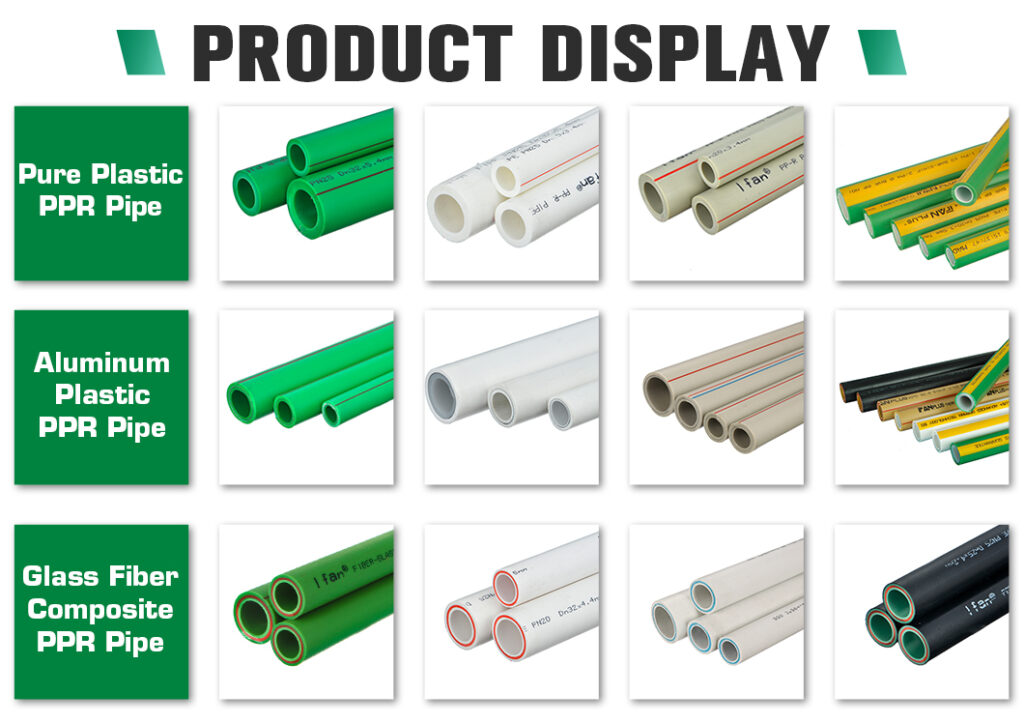Introduction:
PPR Pipes: Redefining Modern Industry Sustainability
The industrial landscape is evolving towards greater sustainability and eco-consciousness, with PPR (Polypropylene Random Copolymer) pipes at the forefront of this transformation. In this article, we explore the diverse applications of PPR pipes across various sectors and how they are contributing to a more sustainable future.IFAN factory 30+ years manufacture experience support color/size customization support free sample.Welcome to consult for catalog and free samples.This is our FacebookWebsite: www.facebook.com.
1. Construction Industry:
PPR pipes are the backbone of the construction industry, revolutionizing plumbing and heating systems. Key advantages include:
High Pressure Resistance: PPR pipes can withstand substantial water pressure, ensuring dependable water supply systems.
Corrosion Resistance: PPR pipes are impervious to chemical corrosion, guaranteeing the longevity of plumbing systems.
Eco-Friendly: Crafted from non-toxic polypropylene, PPR pipes adhere to hygiene standards, making them safe for potable water.
2. HVAC Systems:
The HVAC sector relies on PPR pipes for their superior heat conductivity, making them ideal for heating systems. The smooth inner surface of PPR pipes reduces water flow resistance, improving the efficiency of hot water circulation.
3. Medical Facilities:
PPR pipes are the go-to choice for medical facilities, ensuring hygienic water supply systems. Their non-toxic and antibacterial properties uphold the purity of water, aligning with stringent healthcare standards.

4. Industrial Applications:
PPR pipes shine in industrial settings, particularly in chemical processing plants and pharmaceutical facilities. Their corrosion resistance allows the safe transport of corrosive chemicals without compromising product quality.
5. Agricultural Irrigation:
Agriculture benefits from PPR pipes for irrigation systems. PPR pipes can withstand high water pressure, UV exposure, and diverse weather conditions, promoting sustainability in agriculture.
6. Fisheries:
In the fisheries sector, PPR pipes are indispensable for aquaculture systems. Their corrosion resistance and durability make them ideal for both freshwater and marine aquaculture, facilitating sustainable fish farming practices.
7. Environmental Sustainability:
PPR pipes are leaders in eco-friendliness. Their manufacturing and installation processes have a smaller carbon footprint compared to metal pipes. Moreover, their durability reduces maintenance requirements and extends their lifespan, contributing to a more sustainable use of resources.
Conclusion:
PPR pipes have become the linchpin in numerous industries, offering outstanding performance and environmentally sustainable attributes. Whether in construction, HVAC, medical, industrial, agricultural, or fisheries applications, PPR pipes provide reliable solutions. Their sustainability and eco-friendly characteristics align with the values of a modern, environmentally conscious society. As technology continues to advance, the PPR pipe industry is set to remain at the forefront of delivering durable, efficient, and sustainable solutions across diverse sectors, shaping a greener future for industries worldwide.

